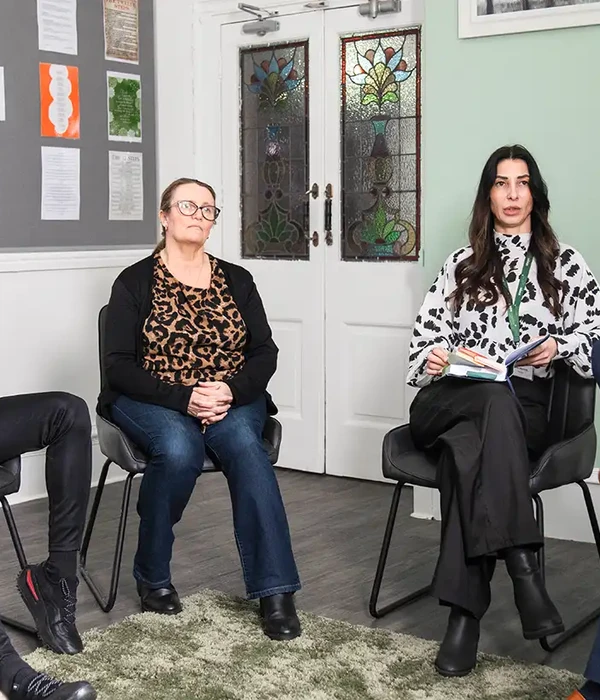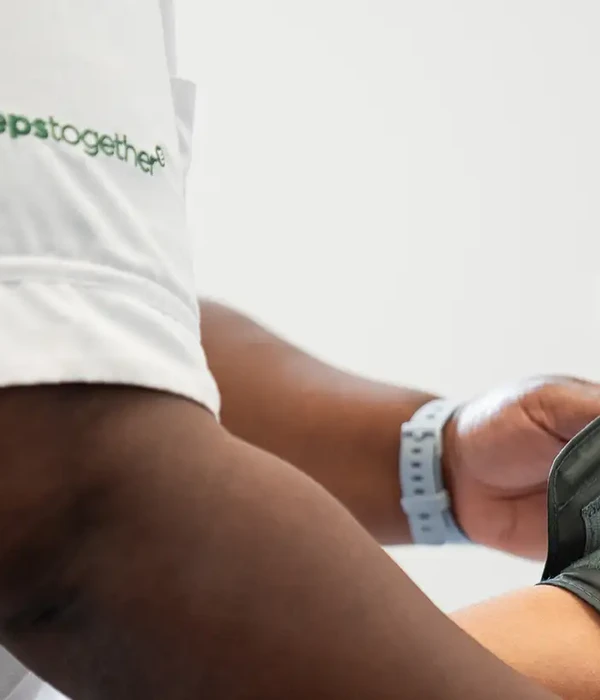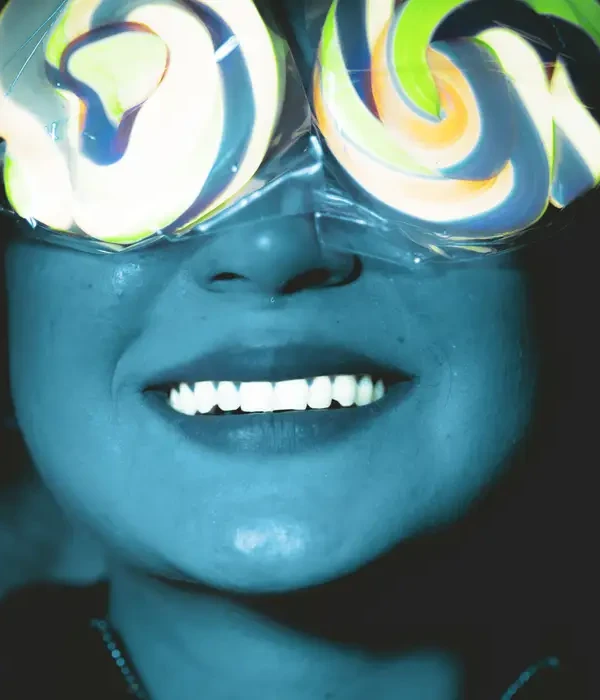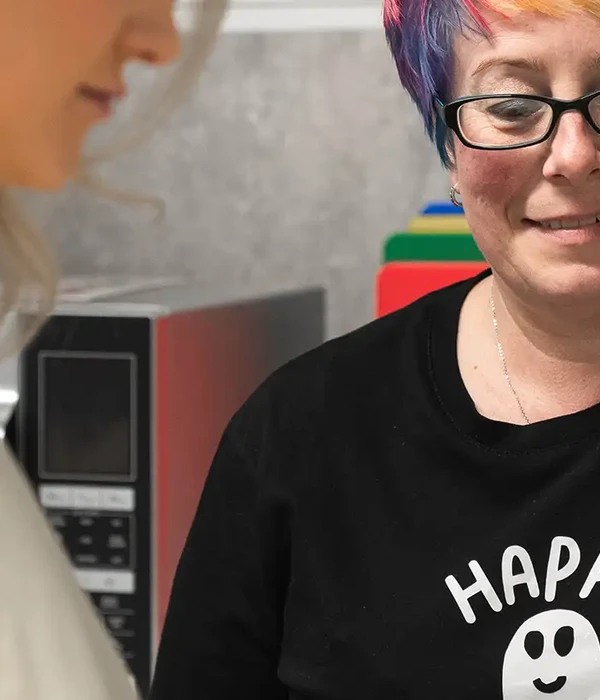Drug Detox
Drug detox is the process of clearing harmful substances from your body and helps you start recovery from addiction, and it’s a process that people who become addicted to drugs will have to go through. This step is important whether you are dealing with alcohol, prescription drugs, or illegal substances.
Detox is just the first step in drug and alcohol addiction treatment, and it can make a big difference for your health and well-being, but you probably want to know more about the procedure, what happens during detox, what it feels like, and how to get help.

Take the First Step Towards Recovery
Steps Together offers personalised support and proven treatments, providing the care, guidance and encouragement you need to move forward with confidence and build a healthier future.

What to Expect from Drug Detox
Drug detox, also known as detoxification, is a medical process that removes drugs or alcohol from your system. Its main goal is to help you safely stop using addictive substances. Quitting suddenly, or ‘going cold turkey,’ can be dangerous because it can cause severe withdrawal symptoms like seizures, intense cravings, or nausea.
A medically supervised detox offers professional support to keep you safe during this stage. Staff will monitor your health and may give medication to lessen withdrawal symptoms. Detox is not a full addiction treatment, but it is an essential step before starting longer-term therapy or rehabilitation.
Types of Substances That Require Detox
Most drugs that cause physical dependence will need a detox process. These include opioids, alcohol, benzodiazepines, and stimulants like cocaine. Each substance affects the body in different ways, so detox approaches may vary depending on what you have used.
When you are admitted to a drug detox programme, you are assessed for the substances in your system. The detox team creates a plan based on your history of drug abuse and current health. You may be given medicine or special support for certain substances, and you’ll also be guided into further treatment once you’ve finished detoxing from drugs.


How Long Does Detox Last?
How long the drug detox process lasts depends on the drug used, how long you’ve been using it, and your health. For many substances, detox can last from a few days up to two weeks. Most withdrawal symptoms start within hours after your last use and peak within the first few days.
Staff may use checklists or assess you daily to monitor your progress and ensure that you stay on track with your treatment. Your treatment needs will be reviewed regularly, and treatment approaches will be adjusted based on those needs to manage withdrawal symptoms, address challenges, and ensure that you get through the programme safely.
Methods of Drug Detoxification
Drug and alcohol detox can be managed in different ways, depending on the type of drug involved, your health, and your support network. Treatment plans may include medical help, structured facilities, mental health care, and natural approaches.
Medically Assisted Detox
Medically assisted detox uses medicines and medical care to help you safely stop using drugs. Doctors and nurses monitor you for withdrawal symptoms and provide medication to reduce discomfort or health risks. You may receive medicines such as methadone, buprenorphine, or benzodiazepines.
This method is important for substances that cause strong physical dependence, such as alcohol, opioids, or benzodiazepines. Medical detox can lower the chance of complications and make withdrawal more manageable.
Outpatient Detox
Outpatient detox allows you to remain at home while attending scheduled visits with a clinic or healthcare provider for check-ups, medications, and support. It’s typically suitable for individuals with mild to moderate dependence, strong support systems at home, and a low risk of serious withdrawal complications.
Many people may choose outpatient detox because it offers them more flexibility, letting them maintain work or family responsibilities. However, undergoing detox outside of a treatment facility doesn’t provide the same 24/7 medical supervision and structured environment as inpatient detox programmes, so it may not be as safe.
Inpatient Detox
Inpatient detox means staying at a specialised facility, usually for several days or weeks, where you receive round-the-clock medical care and emotional support. This approach provides a safe, supervised, and structured environment to help manage withdrawal symptoms and reduce the risk of complications.
Inpatient detox is often recommended for individuals with severe addiction, complex physical or mental health issues, or an unstable or unsupportive home environment. It offers a solid foundation for continuing treatment and long-term recovery.
Mental Health Considerations in Medical Detox
Detoxification affects not just your body but also your mind. You may feel anxiety, depression, mood swings, or cravings during withdrawal. Addressing your mental health needs during detox is important for safety and success.
Professional support can include counselling, therapy, and psychiatric care. Mental health staff may use techniques such as cognitive behavioural therapy (CBT) or medication for anxiety or depression.
Services that our multi-speciality addiction rehabilitation centres offer

Managing Withdrawal Symptoms
You may experience a combination of physical and mental symptoms when you stop using drugs or alcohol. Typical physical effects include sweating, shaking, headaches, nausea, and trouble sleeping. These can start within hours and may last for several days, depending on the substance.
On the mental side, it’s common to feel anxiety or depression. Some people feel irritable or confused. For certain drugs, like opioids or alcohol, the effects can be more severe, with risks of seizures or hallucinations. The specific symptoms and their intensity can differ from person to person, depending on what substance you have been using, how long you used it, and your general health.
Supportive Strategies and Medical Risk
Simple steps can help you feel more comfortable as you go through withdrawal. Staying hydrated and eating nutritious foods support your body’s natural healing process. Rest is important, even if you have trouble sleeping. Some people find relief from anxiety or sleeplessness by using relaxation techniques like deep breathing, meditation, or gentle stretching. If the symptoms are strong, supervised help is best.
Certain withdrawal symptoms can be life-threatening and require urgent medical attention. If you have underlying health problems or a long history of substance use, you are at higher risk for these issues. Medical detox with close monitoring is recommended in these cases. It is important to seek immediate help if you have chest pain, confusion, or seizures during withdrawal.

Long-Term Recovery After Detox
Getting clean is just one part of recovery; it’s also important to stay clean. Being able to identify and avoid your triggers, such as people, can help you stay sober. Many treatment programmes emphasise recognising what your triggers for this reason.
Continuing therapy after rehab boosts your chances of long-term success. Detox helps clear your body of drugs, but it does not solve the mental or emotional reasons behind addiction. Ongoing therapy can help you understand your triggers and build healthier coping skills.
Relapse is a common risk, especially in the months after detox. Staying sober includes recognising warning signs, such as feeling very stressed, suddenly avoiding support groups, or returning to old habits. You can lower the chance of relapse by using tools learned in therapy and maintaining a strong support network.
Stages of Drug Detox
Drug detox is a structured, step-by-step process designed to safely manage withdrawal symptoms and support your physical and emotional stability. Each stage of detox serves a purpose. Detox lays the foundation for continued recovery from drug addiction and helps reduce the risk of relapse.
Assessment and Evaluation
Initially, you will participate in a comprehensive assessment. Medical staff gather details about your physical health, mental state, history of drug use, and any co-occurring health conditions. They may use blood tests, interviews, and screening tools to collect this information.
The team will also check for signs of mental health issues. These can include anxiety, depression, or psychosis caused by substance use. Regular checks and monitoring begin immediately, ensuring support is available as soon as you need it.
Transition to Rehab
Once your drug withdrawal symptoms are managed, the focus shifts to ongoing care. This stage helps you move safely from detox to longer-term treatment, such as rehabilitation, therapy, or outpatient care.
Staff work with you to discuss treatment options and develop a plan that suits your lifestyle and recovery goals. The aim is to connect you with the support and resources you need to maintain progress after detox.
Stabilisation Phase
During stabilisation, you go through withdrawal while receiving medical care and emotional support. Withdrawal symptoms begin quickly, sometimes within hours after stopping the drug.
This phase continues until your body is clear of the drug and your symptoms are under control. The duration of this stage can vary from a few days to a few weeks, depending on the substance used and your health.

We Can Offer You a Safe Detox Process
Drug detox treatment is a vital first step in the rehab process. It helps to clear harmful substances from your body and prepare you for the next stages of your recovery. While it can be physically and emotionally challenging, it’s a necessary part of the process.
Many people feel apprehensive about detox, but at Steps Together, we provide world-class care in a supportive environment. Our experienced team is here to guide you through every stage of the process, making it as safe, comfortable, and effective as it can be.
Frequently Asked Questions
What are the primary methods used in the detoxification process?
Residential detox centres offer the highest level of supervision and support. Some programmes are outpatient, meaning you go home each day, but this is usually for less severe cases.
Are there any risks associated with detoxification?
Detox can be risky, especially when stopping alcohol, benzodiazepines, or opioids. Withdrawal may cause seizures, heart problems, or severe mental health symptoms. Medical supervision greatly reduces these risks. Detoxing without proper care can sometimes be life-threatening.
Can detoxification be done at home?
Some people can detox at home, but only after careful medical assessment. Home detox should only be considered if you have mild withdrawal symptoms and no history of withdrawal complications. Never try home drug detox for benzodiazepines without talking to a health professional because severe withdrawal can be life-threatening.
How long does it typically take to complete a detox programme?
Detox programmes can last from a few days to several weeks, depending on the substance you are stopping and your personal health. Alcohol and some drug detoxes often last about 5 to 10 days. Some symptoms may persist for weeks, even after the main detoxification process is complete.
What symptoms are common during the withdrawal phase?
Most people experience symptoms like sweating, shaking, anxiety, trouble sleeping, and nausea during withdrawal. Some may also have confusion, a low mood, or cravings for the drug. In severe cases, you might have hallucinations or seizures, especially with alcohol or benzodiazepine withdrawal.
What support is available after completing a detox regimen?
After detox, you are strongly encouraged to enter ongoing treatment. This can include counselling, group therapy, support groups, or residential rehab. Many treatment centres offer aftercare plans and ongoing support that help your recovery journey.





